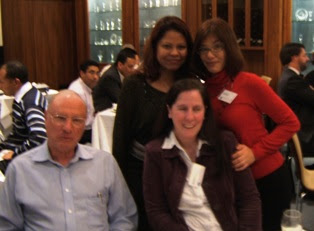More than 3 months have passed since I stopped writing this blog. I was trying to have a contact with an organisation, it falied, I had another chance, it succeeded... and so forth. Finally, I have obtained an offer to enter a site which is on 11th October.
My research is about 5S, as a management concept, which is often adopted in manufacturing, particularly in the automotive industry. However, the organisation I will look at is dealing with public service. How interesting?!
At the same time, I was struggling with setting research orientation, theoretical framework, methodology and methods --- the whole methodology chapter. Developing interview questions was the hardest task ever. Each question needs to be linked to the researcher's ontology and epistemology, as well as to the result of literature review and thus to the primary research question.
How many people actually have considered and done it? I suspect.
Now, my research orientation consists of nominarist ontology and interpretivist epistemology. I did not like to adopt "social constructionism" for ontology and "anti-positivism" for epistemology. In my view, reality is not socially constructed. I think this term is best suitable in sociology, but not in management research. I do not want to argue against positivism because my previous research adopted a quantitative method (content analysis). I cannot be an anti-positivist.
My theoretical framework is symbolic interactionism. My methodology is to be hermaneutic-phenomenology, but with suspect. I know that it is definitely not grounded theory because my goal is not generation of theory. My goal is developing a conceptual framework or model towards theory. What is wrong with this?
Someone told me, "You need to build a theory at the end since you are a qualitative researcher". Huh??? Who said that? Did Max Weber say that?
Only one thing is very clear to me... many qualitative researchers misunderstand that we have to generate theory out of research findings. Theory generation is only possible when the researcher used grounded theory. Since grounded theory is too attractive as it has a concrete set of methodological concepts and procedures, many qualitative researcher have mistakenly used it as a "grounded theory approach". Because they believe that theory generation is only the way that can compete against positivist's theory testing and varification or explanation of causal relationships.
Researchers in the critical theorist paradigm can contribute to existing knowledge by discovering and revealing hidden issues/factors. They do not deal with theory generation. They suggest alternatives to existing theories. This is a respectful contribution. Similarly, interpretivist researchers can contribute to existing knowledge by describing unknown or unfamiliar issues, problems, phenomenon, and so forth, using the ability of
Verstehen (understanding). Why is this not good enough? Why not can you respect this contribution?
Anyway, my method is still a case study. Its design is still multiple-holistic. The case for this study is a 5S program in an organisation and unit of analysis is thus organisation. This is because my study is not about organisations, but a 5S program. Each case of 5S needs to be integrated as a 5S practice within an Australian management context. Individuals within each unit (organisation) act as representatives of the organisation. My research is not study of individuals' perceptions or collective behaviour. My study investigate the meaning of 5S through interactions between people and the 5S program, like studies in Human-Computer Interactions. My research subject is one, 5S, like ethonographers study a perticular culture through people.
Data collection methods involve: formal and informal semi-structured interviews with open questions; photo-elicitation (a combination of photo-recording and interviews); and participant observations with a interrupting stance. Documents and physical artefacts are also needed. Another set of literature review is also required as secondary data.
Data analysis methods include: critical incident analysis; thematic analysis; qualitative content analysis; and perhaps analytic induction. I attempt to achieve trustworthiness of this research. Thus I will not use terms validity and reliability to assure the quality standard of my research. This can be done the use of quality audit methods used in management. It is very practical.
The issue with my research is generalisation. However, I do not need to concern statistical generalisation. Rather, I would have to concern theoretical generalisation. My final outputs are to be integrated as local knowledge, thus it would be subjected to transferbility. This could be assured by reviewing original (Japanese) 5S literature. Bcause case organisations cannot read Japanese so that they do not know what the original 5S concept is.
Another issue immediately will occur. How can I demonstrate whether statements in the Japanese 5S literature are adequately translated (without bias)? Perhaps I will have to use Brisline's "back translation technique" which is very costly.
This is all I have been working on.
 This is a kind of meta-analysis for my research topic called "5S" that often refers to as "housekeeping" or "workplace organisation" in the West. Actually, 5S is more than a tool and therefore those definition are narrowly defined.
This is a kind of meta-analysis for my research topic called "5S" that often refers to as "housekeeping" or "workplace organisation" in the West. Actually, 5S is more than a tool and therefore those definition are narrowly defined. When decomposing all 5S-related articles, 77% of those look like I can incorporate in my literature review in some degree. My next task is to investigate what is written in these 127 articles. I already done my literature review and wrote a chapter, but this small study would help to build my review chapter in a more systematic manner.
When decomposing all 5S-related articles, 77% of those look like I can incorporate in my literature review in some degree. My next task is to investigate what is written in these 127 articles. I already done my literature review and wrote a chapter, but this small study would help to build my review chapter in a more systematic manner.

